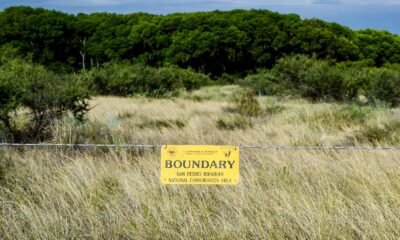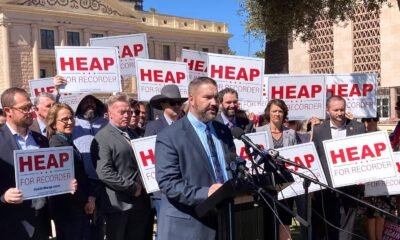Politics
Abortion Support Surges as Arizona Voters Endorse Prop 139

PHOENIX – A strong voter sentiment is emerging in Arizona regarding abortion rights, as early results indicate widespread support for Proposition 139, with a 2-1 approval margin. If passed, the proposition would enshrine the right to abortion in the state constitution, allowing women to terminate pregnancies without state interference until fetal viability, generally recognized as occurring between 22 and 24 weeks.
Beyond viability, healthcare professionals would retain the discretion to permit abortions based on a “good faith judgment” regarding the life or health of the pregnant individual. Yet, opponents, operating under the group name “It Goes Too Far,” argue that this language poses no real limitation; they point out that it could allow any treating healthcare provider, not just the individual’s obstetrician, to make this critical decision. Additionally, they contend that the mental health exception could lead to abortions being performed at any stage prior to birth.
Proponents of the measure, including the coalition Arizona for Abortion Now, counter that most women do not reach late pregnancy stages unless significant complications arise, citing state health department data showing that only 25 of the 11,407 abortions performed in 2022 occurred at or after 21 weeks.
Opponents also express concern that, as a constitutional amendment, Proposition 139 would nullify existing abortion regulations in Arizona, such as ultrasound requirements and waiting periods. Even supporters acknowledge uncertainty about whether it would eliminate laws requiring parental consent for minors seeking abortions.
A financial disparity has impacted the opposition’s campaign, with fundraising reports indicating they gathered under $1.4 million, compared to over $35 million raised by supporters of the proposition.
The debate around abortion rights intensified following the U.S. Supreme Court’s decision in 2022 to overturn Roe v. Wade, which previously guaranteed women the constitutional right to an abortion. Arizona’s own legal landscape shifted dramatically as the state Supreme Court ruled that the 2022 decision allowed enforcement of an 1864 law criminalizing abortions, a ruling that was briefly in effect amid ongoing litigation. State lawmakers later repealed this archaic law, maintaining a 15-week abortion limit without exceptions for rape or incest.
As voters evaluate Proposition 139, it is important to recognize that a defeat would leave abortion policy in the hands of state lawmakers—many of whom expressed support for stricter laws during the repeal discussions. In contrast, the proposed amendment would safeguard abortion rights from legislative changes unless re-voted by the public or altered under stringent conditions requiring supermajority approval.
The abortion rights issue has also influenced other races on the ballot. Notably, in the presidential race, Kamala Harris’s campaign has criticized Donald Trump’s stance, highlighting his role in the Supreme Court appointments that led to the overturning of Roe v. Wade. Concurrently, the U.S. Senate race witnesses rival candidates leveraging abortion rights to their advantage, with Democrat Ruben Gallego spotlighting Republican Kari Lake’s past comments referring to abortion as the “ultimate sin.” Lake now asserts she would respect the will of Arizona voters regarding Proposition 139 should she be elected.
















